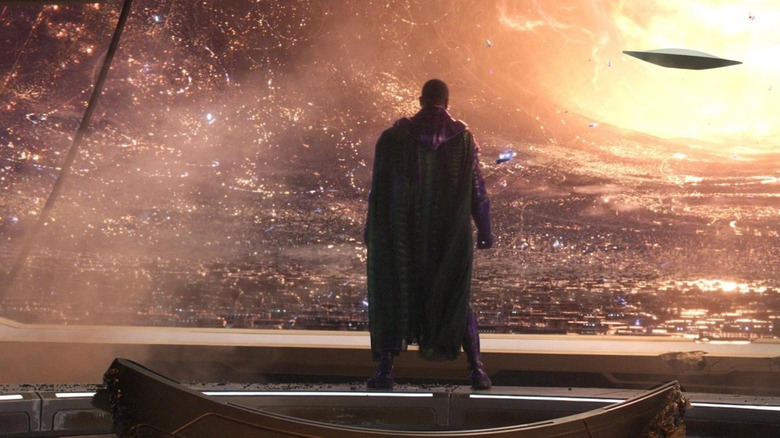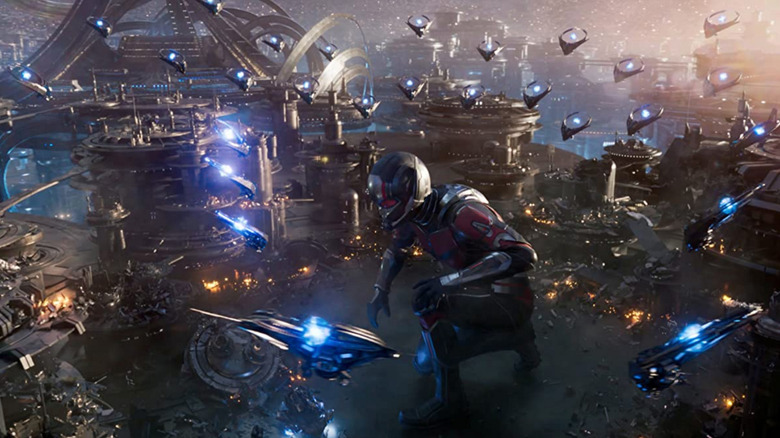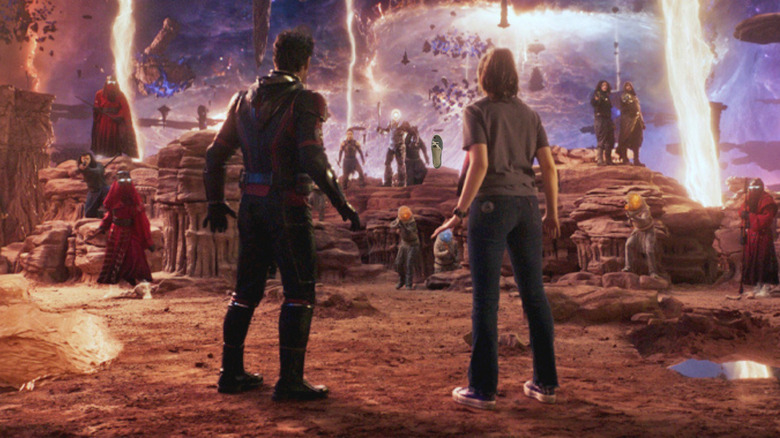Ant-Man And The Wasp: Quantumania Is The Kind Of Film Jordan Peele's Nope Warned Us About
At the very beginning of Jordan Peele's 2022 sci-fi horror epic "Nope," we are greeted with a verse from the New King James Version of the Bible. This specific verse is from the Book of Nahum, 3:6, which roughly translates to "I will cast abominable filth upon you, make you vile, and make you a spectacle." Within the context of the film, this spectacle is materialized through an alien creature who eats anything staring directly at its obscured eye. This borderline incomprehensible monster is the most overt example of spectacle outweighing personhood the film provides, although it is a present theme throughout the story. The decision to open with this specific verse perfectly exemplifies the story of "Nope."
It was also this opening that played on repeat in my head while watching "Ant-Man and The Wasp: Quantumania" in the theater. I was not expecting a masterclass in filmmaking, but I also was not expecting a visual sensory overload that feels overstimulating and hollow all at once. With its depiction of the Quantum Realm and the constant meaningless actions that surround it, "Quantumania" might be the definitive example of the degrading spectacle "Nope" is a direct rally against.
Hollowness pretending to be profound
Very little of "Quantumania" takes place on Earth-616 (the "official" multiversal designation for the MCU). In fact, it's fair to say that around 10% of it takes place there, with the Quantum Realm and its various lands being the real focal point. There's no denying that these worlds and the beings that inhabit them are somewhat cool to look at — in fact, there are some makeup and visual effects throughout that look great. However, the visual style of the film can only do so much to hide the fact that there is no reason for their weirdness.
The Quantum Realm is a setting for audiences to "ooh" and "aah" at. Its joke is that it's weird and unusual, failing to give it or its residents any sort of real hook. Couple this with how emotionally distant everything else about the film is — the characterization, the relationships, the motivations, the jokes — and you are given a movie that says absolutely nothing of substance, but carries itself as if it does. We are supposed to believe that the strained interactions between Scott (Paul Rudd) and his daughter, Cassie (Kathryn Newton) constitute as father-daughter bonding.
It wants us to think that some of the ridiculously quippy, dare-we-call-them "Joss Whedon-esque" one-liners are charming rather than grating. In all reality, however, nothing works because the movie only exists to get to the next movie in as flashy of a way as possible. It is a mindless spectacle in its most hilariously obvious form.
A bad miracle
However, mindless spectacle is not what either the art form of filmmaking or consumers deserve. "Nope" is a movie about plenty of themes, but its central idea of wanting better from our art than the flashiness of modern tentpoles shines through with the release of "Quantumania." It is about resisting the status quo in order to find look towards a better future for the medium, a future where major blockbusters aren't just subpar visual showcases. Much like the first "Ant-Man," Peele's film centers around industry underdogs with dreams of success, specifically the horse-training sibling duo OJ (Daniel Kaluuya) and Emerald (Keke Palmer). Because they are able to see beyond the spectacle-inducing allure of the alien, they are able to prevent themselves from being consumed by it.
It is important to think beyond what Marvel Studios is providing for us, and instead expect and even demand better. Just because a movie of theirs is coasting off on name-brand recognition doesn't mean that they should be allowed to continue pumping out low-quality movies like "Quantumania." After all, what good do these complaints and low reviews do if these types of mindless movies are still making hundreds of millions of dollars at the box office? If "Quantumania" should teach you anything, it's that Jordan Peele's idea of a world so swayed by spectacle that it inadvertently kills itself isn't as far-fetched as many people thought.


